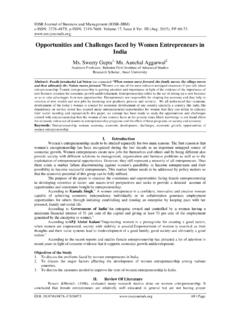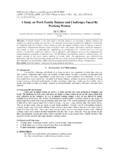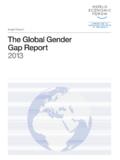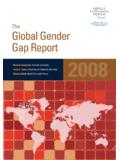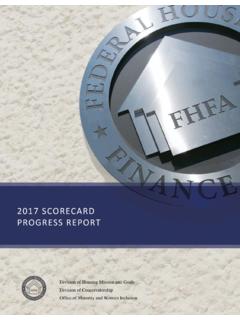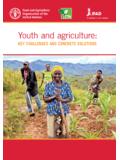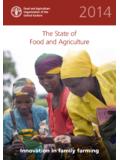Transcription of CIVICUS Report on the Challenges faced by Women in Civil ...
1 Report ON THE Challenges faced BY. Women IN Civil SOCIETY IN AFRICA. March 2011. TABLE OF CONTENTS. CONTENT PAGE. LIST OF 3. ACKNOWLEDGEMENTS .. 4. 1. 5. 2. 6. 3. 7. 4. RESULTS AND 8. 5. 6. RECOMMENDATIONS ..19. 7. REFERENCES ..21. 2. LIST OF ABBREVIATIONS. CEDAW Committee on the Elimination of Discrimination against Women CSO Civil Society Organisations LGBTI Lesbian, Gay, Bisexual, Transgender and Intersex NGO Non-Governmental Organisation OAU/AU Organisation of African Unity / African Union UN United Nations WHRD Women Human Rights Defenders WOZA Women of Zimbabwe Arise 3. ACKNOWLEDGEMENTS. CIVICUS would like to thank all those who contributed to this research. Special gratitude goes to the Africa Women Development Fund and Trust Africa for the financial support and understanding throughout the implementation of the project and the research. We would also like to thank our partners in Egypt, Zimbabwe and Uganda for organising and ensuring that meetings went on as planned.
2 All those Women Human Rights Defenders who provided us with an insight on their Challenges made the production of this Report possible. Last but not least we thank the staff of CIVICUS who coordinated the research process and contributed to the production of this Report . They include Mandeep Tiwana, Caroline Lai, Adam Nord, Sifiso Dube, Judith Seda and Margaret Fish. We believe this Report will highlight some of the Challenges faced by Women human rights defenders in Africa to a broader audience and enable action to address them. 4. 1. ABSTRACT. Over the last few decades there have been renewed calls from Civil society activists and the international community to protect Women Human Rights Defenders (WHRDs) and uphold their rights across the African continent in accordance with myriad international treaties, commitments made at multilateral and bilateral forums, as well those contained in domestic legislation. It is encouraging to note that a large number of African governments have acceded to or ratified at least one of the international or regional conventions or protocols on Women 's rights, and most have adopted national laws aimed at protecting the rights of Women in their respective jurisdictions.
3 Despite these encouraging signs, there nevertheless exist huge Challenges for Women engaged in the defence of human rights on the continent as the lofty values enshrined in law are often times ignored in practice on the ground. The overall environment for Women in Civil society in Africa is challenging. In most places, it is not conducive enough for them to effectively carry out their responsibilities without intimidation and harassment. Even in countries which have ratified laws and protocols on the protection of Women 's rights, there are clear instances where government officials or security forces have shown a lack of understanding of these laws and, in some situations, a blatant disregard for them. In light of these Challenges , CIVICUS undertook to study the major Challenges faced by Women in Civil society in Africa. The study uses the term Women Human Rights Defenders' (WHRDs). to refer to individuals/activists and Civil Society Organisations (CSOs) working primarily to protect and promote Women 's rights in Africa.
4 The end result of the study is not to produce an academic Report but to highlight the major issues in a manner that would set the stage for continent wide advocacy to create an enabling environment for WHRDs. This advocacy Report assesses the institutional framework within which WHRDs operate. Overall, it was observed that WHRDs are more prone to targeting, intimidation and harassment in comparison to their male counterparts. CSOs working exclusively on Women 's rights have to negotiate a fresh set of Challenges as opposed to CSOs in general. Furthermore, the risk for WHRDs operating in situations of conflict increases manifold. The research recommends Government ratification of international and regional protocols that protect Women human rights defenders; establishment of institutions, human rights institutions and others supportive of Women 's rights such as Women 's commissions and/or equal opportunities commissions by countries that haven't done so; ensuring the creation of a conducive legal and policy framework that protects the space of Women human rights defenders, and analysis of the cultural and legal frameworks that discriminate against Women at social and economic levels.
5 Further recommendations are made that the African Union needs to play a role in ensuring that the voices of Women are heard and incorporated in the regional Agenda and that Governments implement resolutions and sign protocols that enforce the protection of Women human rights defenders. It is also recommended that there should be greater solidarity within Civil society to focus on the particular needs and situation of Women human rights defenders through joint statements, 5. coalition building and sharing of alerts, capacity building and magnifying these voices at global forums. The international community also has a role to play in ensuring security and equal opportunities for Women human rights defenders. It is recommended that greater pressure should be placed on governments to remove reservations to CEDAW as well as repeal discriminatory legislation based on religious and cultural beliefs. 2. INTRODUCTION. Civil society activism is growing throughout Africa, with governments and international agencies increasingly calling upon non-governmental organisations to run projects and complement government activities.
6 Aside from service delivery, Civil society also plays an increasingly important advocacy role pressing for legal reform and implementation, ensuring non- discrimination in government policy and advocating for the protection of human rights. However, rather than engage with these critical voices, governments have frequently chosen to silence them, often through harassment, intimidation, threats of closure and even arrests. In Africa, a continent with diverse and complex social, economic and political patterns, it is imperative to look at the varying spaces available for Civil society to operate. In many African countries, the lack of actual protection for human rights and justice, halting democratic reforms, the existence of deep-rooted poverty, harmful traditional practices, restrictive laws and social attitudes all pose serious threats to the work of Civil society activists in the region. For African Women activists, and Women 's organisations, these threats are magnified.
7 Defending Women 's human rights is often seen by state authorities, and even by communities, as a challenge to culture, tradition and a way of life. Through their work, many directly or indirectly challenge social stereotypes regarding the proper role and status of Women . As a result, Women activists not only face repression by governments, but also by their families and other community members. Ongoing armed conflicts on the continent place Women at even further risk of violence. Courageous Women Civil society activists carry out their work amidst attacks on their reputations, threats to their families and their own personal safety, as well as detention and severe gender-specific abuse and punishment. Despite barriers, work on gender equality and Women rights has been well articulated by Women activists and Women organisations across the continent. The pressure mounted by Women activists in Africa has led to the formation of policies and laws at national and regional levels that enshrine their social, economic and political rights.
8 The Protocol to the African Charter on Human and Peoples' Rights on the Rights of Women in Africa, adopted by the African Union Summit in Maputo in 2002 is a testament to the advocacy work by African Women 's networks as well as human rights organisations. In spite of the above mentioned threats, no comparative research had been conducted that assesses the Challenges faced by Women in Civil society across Africa. While country specific research has been produced by some local organisations, including Women of Zimbabwe Arise, and international organisations such as Amnesty International, Front Line and Defending Women , Defending Rights, there is a lack of research that attempts to provide a continent-wide survey of the issues. Such comparative assessment is extremely important, both to identify the Challenges encountered by African Women 's Civil society organisations, and to seek ways to 6. address them in a systematic manner. The research and subsequent advocacy work will benefit Women , national institutions and networks working on human rights and the protection of Civil society activists, in addition to becoming an important reference for regionally integrated work.
9 The main purpose of this research was to identify the Challenges faced by Women 's Civil society organisations in Africa as a result of their work. 3. METHODOLOGY. The methodology used in putting together the Report includes desk research, face to face interviews with individual activists in three diverse countries (Egypt, Uganda and Zimbabwe). and responses received from a survey sent out to CSOs working on Women 's rights across the continent. In carrying out the study, responses were elicited from a wide range of experienced individuals and organisations on the major systemic Challenges facing WHRDs; the overall environment in which WHRDs operate; evaluation of existing laws, regulations and policies which seek to protect WHRDs; and the general cultural or religious context which impedes WHRDs. Country selection criteria The primary research was conducted in three selected African countries to investigate the Challenges facing African Women Civil society activists, from household to national level.
10 The countries selected were Zimbabwe, Egypt and Uganda. The criteria used to identify these countries included: i) Regional diversity. To ensure a diversity of perspectives, three countries were selected from among the various regions of Africa. ii) Prevalence of significant risk to Civil society, particularly for Women 's organisations. For example, lack of freedom of speech, association, restrictive laws relating to Civil society, culture and norms that affect the role of Women Civil society activists. The research examined the legal, political and social environments in which Women Civil society activists in these countries operate. CIVICUS worked with partner organisations in the selected countries to gather the necessary information. Based on the findings the Report was developed, highlighting the Challenges and making recommendations. Gathering secondary data, identifying partner organisations and networks The methodology included desk research for gathering secondary data regarding the Challenges facing Women 's organisations in Africa.








